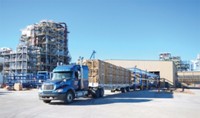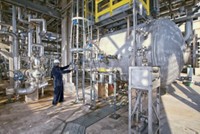Advertisement
Grab your lab coat. Let's get started
Welcome!
Welcome!
Create an account below to get 6 C&EN articles per month, receive newsletters and more - all free.
It seems this is your first time logging in online. Please enter the following information to continue.
As an ACS member you automatically get access to this site. All we need is few more details to create your reading experience.
Not you? Sign in with a different account.
Not you? Sign in with a different account.
ERROR 1
ERROR 1
ERROR 2
ERROR 2
ERROR 2
ERROR 2
ERROR 2
Password and Confirm password must match.
If you have an ACS member number, please enter it here so we can link this account to your membership. (optional)
ERROR 2
ACS values your privacy. By submitting your information, you are gaining access to C&EN and subscribing to our weekly newsletter. We use the information you provide to make your reading experience better, and we will never sell your data to third party members.
Business
KiOR Files For Bankruptcy
Cleantech: Troubled advanced biofuels maker defaulted on loan from the state of Mississippi
by Melody M. Bomgardner
November 10, 2014

Continuing a decline that began last year, the advanced biofuels maker KiOR filed for Chapter 11 bankruptcy protection on Nov. 9.
The move follows the firm’s Oct. 31 default on a $78.6 million debt repayment to the state of Mississippi, according to filings with the Securities & Exchange Commission. The default triggered an early-repayment requirement from other debt holders, including the province of Alberta, for an additional $234 million.
KiOR, which sought to convert wood into biofuels using a catalytic cracking process, has been in dire financial straits since late 2013. Despite significant financial backing from marquee investors Vinod Khosla and Bill Gates, it had been unable to produce promised volumes of biofuels from its commercial-scale facility in Columbus, Miss.
In January 2014, the company shut down the plant to install upgrades to improve output and the reliability of its pyrolysis and catalyst technology. But by the end of March, the plant had not produced any fuels, and the firm warned that it would run out of funds for operations.
In a statement about the bankruptcy filing, KiOR says it has refocused its efforts on R&D. Many of KiOR’s private loans came from venture funds controlled by Khosla. Indeed, Khosla has made a bid for the firm’s assets, not including the Columbus facility, which is owned by a KiOR subsidiary and not included in the bankruptcy filing. The investor has also agreed to provide $15 million in debtor-in-possession financing.
KiOR was delisted from the NASDAQ stock exchange on Oct. 27. Any assets of the firm will go to its creditors; stockholders are not expected to recover any funds.




Join the conversation
Contact the reporter
Submit a Letter to the Editor for publication
Engage with us on Twitter